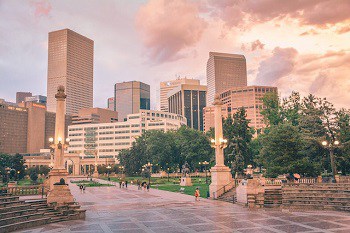Denver Enacts Landlord Licensing Ordinance

The licensing regime is based upon each property, and a landlord holding multiple properties is required to obtain a residential rental property license for each property, although the director may issue a single license for any residential property located on two or more contiguous parcels under the same ownership.
A residential rental property is defined as any building, structure, or accessory dwelling unit that is rented or offered for rent as a residence. Excluded from the definition are on-campus college housing and other licensed facilities.
“Rent” includes receiving or offering money, services, or other remuneration in exchange for occupation of a residential rental property.
While the current licensing regime only applies to two or more dwellings, starting Jan. 1, 2024, the licensing will be required for a residential rental property containing a single dwelling unit. This includes single-family homes, a single dwelling in a condominium, or any other type of home where only one dwelling on the parcel is available for rent.
Pending obtaining a residential rental property license, a landlord may continue to operate after the date a license is required if the landlord has submitted an application, the application is pending, the landlord has completed an inspection, and otherwise complies with the ordinance and any rules or regulations adopted by Denver.
Applications may be referred to other Denver agencies, such as the Department of Public Health and Environment, Zoning Administration, the Fire Prevention Bureau, the building inspector, and the Wastewater Division of the Department of Public Works. To the extent that other necessary permits, licenses, or other regulatory approvals have not been obtained, a landlord’s ability to rent may be limited until all necessary permits, licenses, and approvals have been obtained.
The ordinance includes requirements to maintain the premises in compliance with applicable law, all appliances must be in good working order, free of leaks or other defects and not cause any unsafe or unsanitary conditions. In addition, the landlord must ensure that there is a functioning smoke detector, carbon monoxide detector, and fire extinguisher.
In addition, an application will not be approved unless the landlord provides a verification of the successful inspection in a form required by the Department of Public Health and Environment. Properties with multiple dwelling units are required to allow a minimum of 10% of the units to be inspected at random and at least one unit at random if there are less than 10 dwelling units. Inspectors must be in compliance with home inspector certifications required by Denver. All inspections must be completed within 90 days of the application. However, newly constructed rental properties are not required to be inspected if the application is submitted within four years after the date of issuance of the certificate of occupancy or temporary certificate of occupancy.
After issuance, the licenses are not transferable from landlord to landlord or from one location to another. Licenses are valid for four years, or if earlier, when title to the property is transferred.
Failure to comply with the law may result in suspension, revocation, or other sanctions.
Source: JD Supra; written by Sherman & Howard L.L.C.















 Accessibility
Accessibility